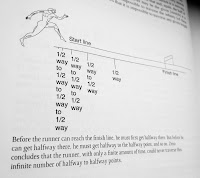
Time... space... matter... what is this whole world about? My knowledge in Physics is only elementary, but I don't want this to stop me from giving my own views on this subject. After reading The Arrow, one of Zeno of Elea's paradoxes, I thought that I should give Physics a shot.
Just to give you a brief introduction, Zeno of Elea was a Greek philosopher in the pre-Socratic era. He claims that motion is just an illusion. This concept was illustrated in his paradox called The Arrow. He explains that an arrow in a trajectory is not in motion because if we observe the position of an arrow at a given instant, the arrow would be in a 'frozen' state, hence, not moving.
Zeno suggests that motion is a function of time. Using our conventional method of measuring time, we could divide time in fractions of a second. If we continue dividing time into fractions, we would arrive at a certain measure where time is infinitely short. An arrow would have to travel in an infinite fraction of time before it could reach a certain position in space, such as from point A to point B. Also, the arrow would have to travel forever if it is moving in an infinite number of infinitely short periods of time.

He explains that motion is also a function of space. Using the same logic, we would arrive at a certain measure where distance is infinitely small. Therefore, an arrow in trajectory would have to travel an infinite fraction of space before it could go from point A to point B. It would appear that the arrow is at rest because the given points between A to B are practically located in the same space.
Now, what are my thoughts on these? Does Zeno's paradox explain that motion is nothing but an illusion?
Zeno's paradox does not entirely support the fact that there is no motion. It simply questions the idea of infinity. How does an object behave in infinity? This is a question that determines boundaries and limits. Based on Zeno's paradox, motion, time and distance do not exist because their boundaries and limits are undetermined. Therefore, his paradox only supports the idea that the concept of motion, time, and space are undetermined, not the fact that they do not exist.
Also, Zeno questioned the boundaries and limits of the given dimensions, but he did not question the boundaries and limits of our senses. Just because we are unable to observe a certain phenomena in detail, does not suggest the non-existence of it.
_____________________________________
Source: Baird, F. & Kauffman, W. (2008). Zeno of Elea, The Arrow. Ancient Philosophy, Philosophy Classics, 5h Edition, Volume I. Pearson Prentice Hall, New Jersey, (pp. 26-30).
No comments:
Post a Comment